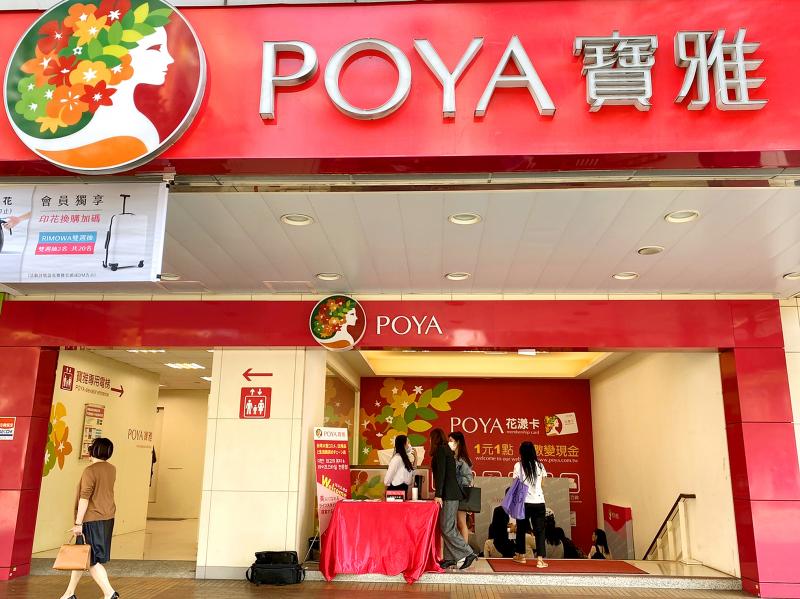Poya International Co Ltd (寶雅國際), which operates a retail network selling cosmetics, lingerie and stationery, reported that revenue last month grew 11.77 percent monthly and 5.48 percent annually to NT$1.32 billion (US$44.35 million), as sales were the highest in the company’s history for May.
The growth could be attributed to new store openings — including four Poya cosmetics stores and nine Poya Home (寶家) hardware merchandise and household goods stores — and its promotional campaign to attract consumers who have stayed at home amid the COVID-19 outbreak, it said on Wednesday last week.
In the first five months of the year, cumulative revenue totaled NT$6.77 billion, up 7.6 percent from a year earlier, Poya said.

Photo: Amy Yang, Taipei Times
As of the end of last month, the company operated 234 Poya cosmetics stores and nine Poya Home outlets nationwide, data released at an investors’ conference on June 3 showed.
On Saturday, the company launched its 235th Poya cosmetics store in Taipei’s East District area. The Zhongxiao-Fuxing store is part of seven new store openings the company has planned for this month, including six Poya cosmetics stores and one Poya Home store in Taichung.
The company is also scheduled to launch a Poya Home logistics center in Taoyuan’s Yangmei District (楊梅) next month.
As the COVID-19 situation has been kept relatively under control in Taiwan, and because Mirada (美華泰), another local cosmetics and beauty product chain operator, is closing its remaining 15 stores this month, Poya is expected to maintain steady single-store sales growth throughout this year, market watchers said.
The company’s net profit grew 8.73 percent year-on-year to NT$493.97 million in the first quarter, with earnings per share of NT$5.06, compared with NT$4.65 a year earlier.
“Poya Home is likely to be the next growth driver, as Taiwan’s hardware merchandise market is scattered and lacks modernized stores,” Yuanta Securities Investment Consulting Co (元大投顧) said in a recent note. “In addition, Poya Home targets the male and family segments, complementing Poya’s targeted female customers, while Poya Home’s gross margin would be higher than Poya cosmetics chain in the long term.”

In Italy’s storied gold-making hubs, jewelers are reworking their designs to trim gold content as they race to blunt the effect of record prices and appeal to shoppers watching their budgets. Gold prices hit a record high on Thursday, surging near US$5,600 an ounce, more than double a year ago as geopolitical concerns and jitters over trade pushed investors toward the safe-haven asset. The rally is putting undue pressure on small artisans as they face mounting demands from customers, including international brands, to produce cheaper items, from signature pieces to wedding rings, according to interviews with four independent jewelers in Italy’s main

Japanese Prime Minister Sanae Takaichi has talked up the benefits of a weaker yen in a campaign speech, adopting a tone at odds with her finance ministry, which has refused to rule out any options to counter excessive foreign exchange volatility. Takaichi later softened her stance, saying she did not have a preference for the yen’s direction. “People say the weak yen is bad right now, but for export industries, it’s a major opportunity,” Takaichi said on Saturday at a rally for Liberal Democratic Party candidate Daishiro Yamagiwa in Kanagawa Prefecture ahead of a snap election on Sunday. “Whether it’s selling food or

CONCERNS: Tech companies investing in AI businesses that purchase their products have raised questions among investors that they are artificially propping up demand Nvidia Corp chief executive officer Jensen Huang (黃仁勳) on Saturday said that the company would be participating in OpenAI’s latest funding round, describing it as potentially “the largest investment we’ve ever made.” “We will invest a great deal of money,” Huang told reporters while visiting Taipei. “I believe in OpenAI. The work that they do is incredible. They’re one of the most consequential companies of our time.” Huang did not say exactly how much Nvidia might contribute, but described the investment as “huge.” “Let Sam announce how much he’s going to raise — it’s for him to decide,” Huang said, referring to OpenAI

The global server market is expected to grow 12.8 percent annually this year, with artificial intelligence (AI) servers projected to account for 16.5 percent, driven by continued investment in AI infrastructure by major cloud service providers (CSPs), market researcher TrendForce Corp (集邦科技) said yesterday. Global AI server shipments this year are expected to increase 28 percent year-on-year to more than 2.7 million units, driven by sustained demand from CSPs and government sovereign cloud projects, TrendForce analyst Frank Kung (龔明德) told the Taipei Times. Demand for GPU-based AI servers, including Nvidia Corp’s GB and Vera Rubin rack systems, is expected to remain high,